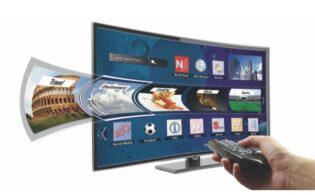Ruth Berry, managing director of ITV Studios’ global commercial division, addressed MIPTV delegates in a Media Mastermind keynote today in Cannes, outlining her new remit, trends in non-scripted entertainment, the acquisition of Plimsoll Productions and opportunities in the FAST segment.
Earlier this year, Berry was promoted to lead a unified commercial division across global distribution and global entertainment, putting her in charge of a catalog encompassing 90,000 hours of content and more than 280 formats.
“We’re bringing together the formats and the finished programming businesses to create a singular multi-genre, multi-brand, multi-dimensional commercial business at the heart of the studio,” Berry said. “Be that deficit financing and licensing rights to a brilliant scripted slate, rolling out new formats, merchandising, moving into the metaverse—we have all these things in one place. My role is to get my arms around all of that and marry it up and align it to our buyers and the market and the needs and the trends and all of those things.”
Berry noted the overlap in the client base across scripted and entertainment. “If we can bring that all together, we can focus those conversations in fewer conversations with our clients and really look at how we can leverage that breadth and scale of the portfolio with what our buyers need. I always say to the sales team that I’d like them to be in the top three on a buyer’s list of their call sheet. I’d like them to be number one! For us, having that portfolio in one place and that huge amount of scale hopefully helps us do that. To that end, internally we’ve renamed the two businesses as global partnerships, which I think is very emblematic of the aspiration for us to partner on a broader, deeper way with more content across the portfolio with our clients.”
Berry talked about the company’s extensive slate of megaformat brands, which include Love Island and The Voice. “There are amazing juggernauts in there. What’s important about having these brands is they are sustainable and they keep growing and we can refresh them, grow them, expand them. We’re doing that. Some of the brands are evolving into new evolutions. They are also delivering year on year. Looking at how we extend those brands, how we reach into different audiences. We’ve learned an enormous amount from Love Island. It sits largely in that 16-34 bracket. Where those audiences are finding their content is not through EPGs, it’s through social media and other things. How we extend those brands into those mediums is really important. We’ve created an experience for The Voice in the metaverse. You’ll see Hell’s Kitchen content going into the metaverse. We’re starting to look at how those brands live and breathe beyond the TV screen.”
Berry highlighted some of the company’s new format brands, including My Mum Youd Dad, Scared of the Dark and I Kissed a Boy before discussing the importance of natural history to the company with its acquisition of Plimsoll Productions last summer. “Plimsoll is a brilliant organization and the largest independent producer of natural-history programming in the world. For us a distribution business, accessing natural history has been quite tough. It’s a pretty closed genre, so this seemed like a brilliant opportunity for us to be able to enter the natural history space, which we’ve seen go from strength to strength over the last few years. To marry natural history with us from a deficit-financing perspective is really interesting because the size of the budgets are much more like dramas. You’re looking at co-financing, co-producers, deficit financing and putting together enormous scale shows that actually take even longer than a drama to produce, and taking them to market. It’s a very different cadence, but a brilliant one. It’s a brilliant partnership and I’m really excited as to where the journey can take us next with Plimsoll.”
The session then moved onto the opportunities in the FAST and AVOD spaces. “It’s been a really interesting growth area for us over the last few years. We’ve launched a number of FAST channels around the world. We’re very focused, particularly on the U.S. market, where there’s a huge amount of growth in that online advertising business. And also in the U.K., Germany, Australia and various other pockets. Having 90,000 hours of content in your catalog, it’s incredible what you can re-earth with the library content. We’ve created various channels with our factual library, and single-IP brands. When we look at where some of our single-IP brands go into that world, where catalog content can enter into that space. It’s a really interesting world and it’s part of our ecosystem. We license programming, linear, nonlinear, short-form, long-form, to free to air and pay television. It’s part of that ecosystem now, which I think is really exciting. We didn’t expect that three years ago.”
Moving from strictly B2B to B2C “doesn’t come without its challenges, because our infrastructure has been focused on the B2B business. So adapting ourselves into something more direct towards the consumer has its challenges. But getting that data is worth it because we can start to see how our audiences engage with that content. We can see who’s engaging with it. We can think about two things. One, advertising inventory, and what that might mean about sell-through rates and CPMs and what we can generate around that content and the distribution of content through that channel side. [Two], what that data can mean for what we should be developing as a production business as well, or where we can bring brands and shows back into markets. We’re starting to harvest the data.”
On how she’s making sure ITV Studios stays on top of the new opportunities presented by emerging technologies today, Berry said: “It’s also my role to focus on how to fund and monetize content. [We keep] an eye on several things: where are the audiences? How much of new technology enables you to extend your marketing reach? How much of that is about monetizing it? Some of the new technologies still require a proof of concept. People consume them. What it means for us as a business is continuously a watching brief. We have to have our eyes wide open around what the metaverse means. We know that this new technology is evolving all the time and it will change the landscape of our business. It’s really keeping an eye on them and seeing which are the ones we need to provide for the future for and which ones come and go.”






